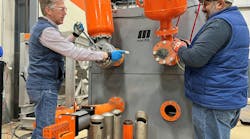Farmers in many parts of the United States, especially west of the Mississippi, are competing for water against deep-pocket oil and gas companies.
As the shale energy boom gathers speed, increasing amounts of water are being mixed with sand and chemicals to make up fracking liquids. On the one hand, this certainly helps U.S. industries that benefit from cheap shale gas and oil — but on the other, it is draining resources from farmers.
Kent Peppler, fourth-generation farmer from Colorado, explains that he may have to cut corn production this year, simply because he could not afford to pay for the water needed to irrigate his crops.
Water supply in this part of the country is short anyway and the presence of fracking operations is driving water prices up to levels that regular farmers cannot afford. In the past Peppler was charged between $9 and $100 for an acre-foot of water in auctions organized by cities with ample supplies, but recently oil and gas companies pay those same cities anywhere from $1,200 to $2,900 per acre-foot, he says.
EIA report revises global shale oil-and-gas reserves upwards
For example, in 2012 the Denver suburb of Aurora pocketed $9.5 million from a deal with oil company Anadarko. Under the terms of the contract, the company will receive a total of 2.4 billion gallons of treated sewer water from Aurora over a period of five years.
Similarly, farmers from Texas are reported to be scaling down cotton production over water concerns. Local water authorities attribute the drop in water supplies to drilling companies that have ramped up operations, and consequently water consumption, the Environmental Expert reported.
About 15,000 acre-feet of water is drawn annually from the Carrizo-Wilcox Aquifer to frack wells in the southern half of the Eagle Ford Shale, one of the nation's richest oil and gas fields. This is close to half the water recharged into the southern portion of the aquifer on an annual basis. The Carrizo-Wilcox Aquifer serves five counties and about 330,000 people, according to Ron Green, a scientist with the nonprofit Southwest Research Institute in San Antonio.
GE to invest billions to improve fracking
Ed Walker, general manager of the Wintergarden Groundwater Conservation District, which runs an aquifer that supplies water to farmers and about 29,000 people in three counties, also raised concerns about the role that the oil and gas industry is playing in water management. The area is already hit by drought and fracking only aggravates the problem, he says.
Experts say the amount of water required for fracking can vary significantly, depending on how accessible the shale reserves are. For instance, an average drilling well in Texas requires up to six million gallons of water, whereas in California the necessary amount varies between 80,000 and 300,000 gallons.
As a means to lift some of the pressure from local water resources, many oil and gas companies are investing in state-of-the-art water recycling systems, the Environmental Expert said.


